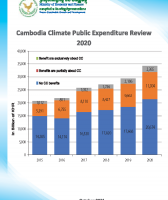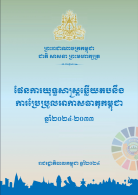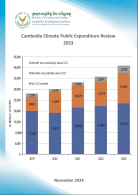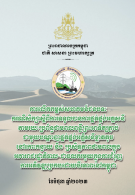Cambodia Climate Public Expenditure Review 2020

- Date of publication: March 2022
- Institution: Ministry of Economy and Finance (MEF)
- Author: Ministry of Economy and Finance
- Language: English
- Type: Document
- Page: 32
As one of the countries most affected by climate change, Cambodia has committed to address this challenge both locally and internationally. Cambodia submitted its updated Nationally Determined Contribution (NDC) to the UNFCCC on December 30, 2020, and a Cambodia Climate Change Strategic Plan (CCCSP, 2014-23) is in place with action plans in 14 ministries and agencies. Since 2017, Ministry of Economy and Finance has included guidance on climate change in annual budget circulars, and in 2019 climate change was recognized as a key challenge to be addressed both in the debt policy and in the budget of the Government. Key ministries have also started to integrate climate change in the way they prioritize activities for the national budget with technical supports from our partners.
This report provides an update on climate finance trends, including data up to fiscal year 2020, to monitor to what extent Cambodia and its development partners are effectively supporting national climate change priorities. This year's report has benefitted from further improvements in the quality of data available and actual expenditure of the sub-national administrations (SNA), which represent a growing percentage of the government budget expenditure, at 7%.
In 2020 expenditure, climate change expenditure remains high at 2.2% of GDP (from 2% in 2019) or KHR2.365 billion. The main component some other investments but it also had
soma climate change resilience co-benefits for the most vulnerable, For example, social protection through cash transfer to the vulnerable groups and the poor has been implemented as part of the Covid-19 measures, amounting to USD 300 million spent in the first phase.
In the current Government mandate (2019-23), climate change is better reflected in the National Strategic Development Plan. This has to be translated into sectoral strategies and budgets, While the level of climate-relevant public expenditure keeps increasing, it is still below the levels required to address the climate change issues that Cambodia is facing, Continued infrastructure development against food and drought is required, as well as interventions in livelihoods, water supply and social sectors.
This report also takes a look at gender issues in the climate change response. Partial data indicates that gender issues remain under-addressed in climate change programmes. Case studies of specific climate change programmes show that initiatives have been taken to address these gender Issues, but comprehensive information on the effectiveness of these efforts is not always available. This is an area where progress needs to be made, so that the most vulnerable groups are effectively protected and that women and men can contribute to increased resilience and low carbon development.
The Ministry of Economy and Finance will continue to be actively involved in these efforts to assess the effectiveness of climate finance, alongside the National Council for Sustainable Development andthe Council for the Development of Cambodia.



